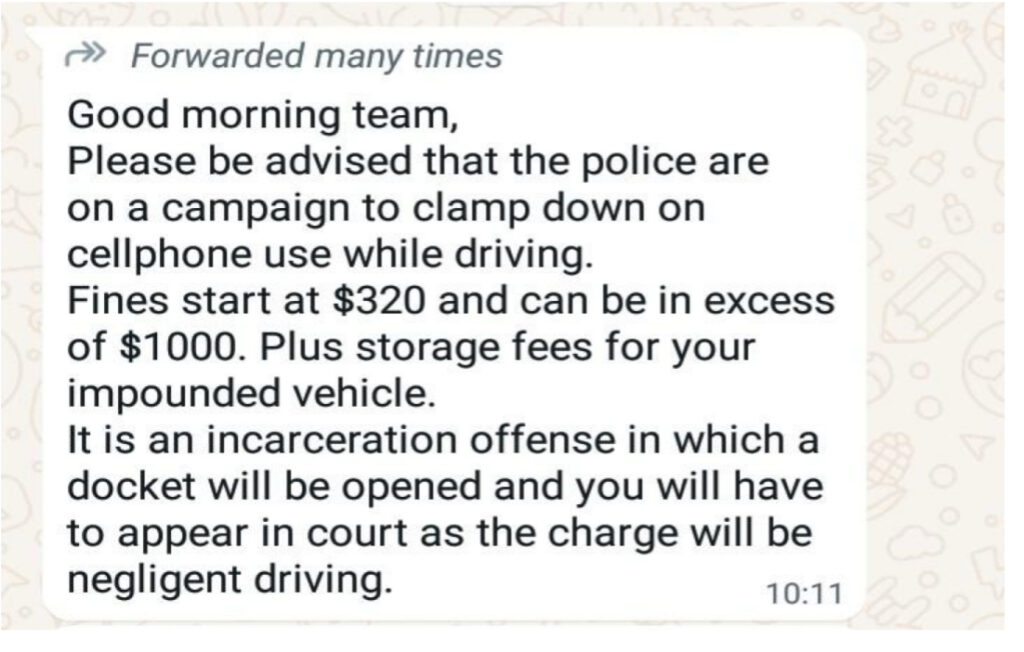CLAIM: … police are on a campaign to clamp down on cellphone use while driving. Fines start at $320 and can be in excess of $1000. Plus storage fees for your impounded vehicle.’
SOURCE: Social Media Viral Message
VERDICT: False
On June 21, 2024, a message circulated on WhatsApp and was forwarded many times. The author claimed that police were on a campaign to clamp down on motorists who use cell phones while driving. The writer further claimed that fines for that offence range between $320 and $1000, excluding storage fees for impounded vehicles.
‘It is an incarceration offense (sic) in which a docket will be opened and you will have to appear in court as the charge will be negligent driving,’ added the WhatsApp message.

Police Position
Bulawayo provincial police spokesperson Inspector Abednico Ncube dismissed the message as fake, adding there was no such operation by police.
‘That is social media, we do not have fines like that as police,’ said Inspector Ncube.
‘We have nothing like that, that’s false. This is a social media issue; it is not from the police.’
He said police fines for driving on the phone do not go beyond US$30.
‘I am not at the office at the moment but fines that are paid at police stations are around US$30,’ he explained.
‘Driving while on the cell phone can cause an accident which can lead that person to go to Court. Once you see higher fines, know that it is no longer a police but a Court case. That’s where higher fines are applicable.’
Zimbabwean traffic fines in the current notice are expressed in USD, although that does not mean that the fines are only payable in USD. These amounts can be converted to local currency as stated in Section 4 of the current notice.
Although offences go all the way to level 14 (a fine of up to US$5000), Zimbabwean traffic fines that can be handled by the police range from level 1 which can be a caution (for driving 1 to 5 km per hour in excess of the speed limit) or US$5 (for cyclist failing to use cycle track) to level 3 with a maximum ofUS $30 fine (driving between 36 and 50 km per hour over the speed limit).
Anything beyond level 3 goes straight to court (for example, driving in excess of 50 km per hour over the speed limit which is level 6).
It is important to remember that the monetary amounts fixed for the different levels of fines usually represent the maximum fines that may be imposed for those levels. This is because most statutory penalties are expressed as maximums: for example, section 50 of the Road Traffic Act, states that anyone who drives a vehicle at an excessive speed is “liable to a fine not exceeding level six …” Hence persons found guilty of speeding can be sentenced to a fine of up to level six (now US$300) but no more, and often will be sentenced to a lower fine.
It is also important to note that as mentioned earlier, this person (being charged with excessive speed) will have to go to court as this falls outside the jurisdiction of police spot fines.
Effect of the level 3 fine on “spot fines”
Level 3, as noted, is fixed at US $30. This is important because it is the level at which spot fines are fixed in terms of the Criminal Procedure and Evidence Act. Section 141 of that Act states that police officers can issue notices commonly called “tickets” to people who have committed offences such as minor traffic violations for which they are unlikely to receive a sentence of more than level 3. The notices call on the person concerned to appear in a magistrates court on a specified date to face a charge of committing the offence, but say that if the person is prepared to admit the offence, he or she can pay the specified fine ‘which must not exceed level 3’ at a police station and so avoid the trouble and inconvenience of appearing in court.
By fixing level 3 at US $30, the new notice limits the fines that can be imposed through tickets to US$30 or the local currency equivalent. Heavier fines can be imposed only by courts.
According to Veritas, Section 141 of the Criminal Procedure and Evidence Act does not give police officers power to demand that fines be paid in cash on the spot. There is nothing illegal about a driver voluntarily paying a fine on the spot, though he or she should insist on a proper receipt, but a police officer cannot insist on such payment and an officer who does insist on it is guilty of extortion, a very serious offence. The driver must be given the option of going to a police station to pay the fine.
Conclusion
The claim: ‘… police are on a campaign to clamp down on cellphone use while driving. Fines start at $320 and can be in excess of $1000. Plus storage fees for your impounded vehicle,’ has been rated as false. Police have dismissed it as part of misinformation peddled by social media users. Fines for offences payable at police stations do not exceed US$30. However, some offences that involve driving while using a cell phone can be above a level 3 offence. These will be taken to court and prosecuted. In such cases the fines imposed by the courts will be beyond US$30.











